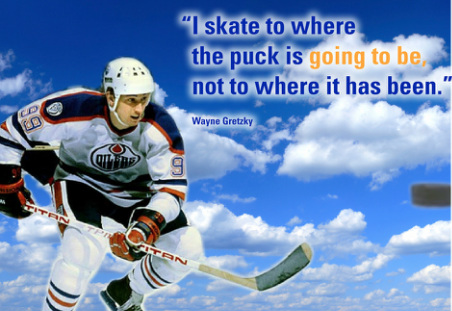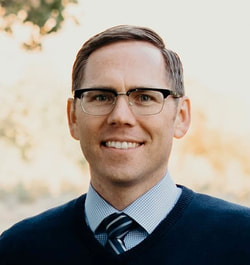|
As I've been engaging with my personal learning network of Extension professionals over Twitter, Google+ Hangouts, and through Google Docs - where we've been collaborating on presentation abstracts - this Wayne Gretzky quote has been on my mind. It's one thing to stay relevant and to keep up, which Cooperative Extension is currently struggling with, but it's another thing to "skate to where the puck is going to be." I feel this takes risk. The kind of risk that will often times lead to failure, but eventually success if we keep trying. Leading up to the IPO of Twitter, Co-Founder Biz Stone reflected on how far the company has come. He states in this Inc.com article, that "[Entrepreneurship] is all about making mistakes." I'm glad he said this because so many people are ashamed to fail or make a mistake, so they just don't try. I love learning from my mistakes, holding After Action Reports, and debriefing on my Extension workshops, activities, and events. Our mission is to extend the research of our Land-Grant Universities and use it to improve people's lives. I believe this is a process we can improve on everyday as we seek excellence. Dare I say, "Extension work is all about making mistakes?" A 21st Century Extension Professional has got to think outside the box and try new things (that might fail). Here are some other ideas I had on How to Fix Extension: 1. Narrate Your Work - Often we have no clue what the agent from our neighboring county is working on. Maybe it's similar to what we're working on? I would venture to say there are at least a couple agents from across the country that are working on similar projects like yours...right now...if not, there's probably several who would be interested in collaborating with you. If we don't narrate and share what we're working on, we'll each create the same small wheel that won't get us very far. If we work together we can create one really big wheel that would travel faster and farther. I learned this from John Dorner from NCCE, he went on to say:
By sharing what projects you are working on, your successes, your failures and your frustrations with others, you will be surprised by how much help you will be offered. Help could be in a link to a useful piece of information, a piece of advice, a document, presentation or spreadsheet someone from someone who has been there before or maybe just a kind word. I'll wager the time you spend sharing what you are working on will be recouped many times over by saving you from recreating a small wheel that has been created by someone else. You can spend your time on starting at their end point. John has been in my personal learning network since I started in Extension. He's retiring and I wish him the best in this next phase of life. Please take a moment to read John's last TechTalk article. Following his advice would do so much to fix Extension. 2. Re-think Scholarship - Eric Stafne, from Mississippi State University wrote an incredible article, entitled A View of Digital Scholarship in Extension for the Journal of Extension last month. In his abstract he states: Methods for Extension personnel to engage clientele are developing rapidly. Social media and online content are used by eXtension members to generate information and deliver it quickly. These methods are found useful by information consumers; however, many universities fail to adequately address them in the promotion and tenure process. Engaged eXtension members understand the importance of using digital methods, yet career value of the effort is unclear. This ambiguity has caused participation issues within eXtension Communities of Practice. A new examination of how Extension content is valued by the consumer and by colleagues within the academic arena is warranted. This goes back to my notion for a 10% social media appointment for all Extension professionals. People no longer need an expert to give them information. They can search and find it themselves without Extension's help. They don't care what information is best, they rely on what's available. If we are to fulfill our mission, we have to present our unbiased, research-based information "in an exciting, accessible, credible, and engaging way without sacrificing accuracy, integrity, or relevance, and this can be done through digital scholarship." Thanks for sharing Eric! You wrote exactly what I have been thinking. 3. Start a Podcast - Bob Bertsch just interviewed me for his Working Differently in Extension podcast. It's a phenomenal collection of interviews. His podcasts run about 30 minutes and I can finish listening to a session on my way to and from my office each day. I've learned so much. Thanks for doing this Bob! Although I was really nervous - I've never been recorded on a podcast before - I had a really good time. I love the idea of Extension professionals having podcasts. It looks like a lot of work, but I think just getting over the learning curve would be the hardest part. I also think collaborating with a team of Extension professionals from across the country could lighten the work load and add even more value, similar to co-authoring a blog. I highly recommend following the Working Differently in Extension podcast. It will help you become a better Extension professional. I want to know about your ideas and what you are doing. Please tweet me or find me on Instagram and lets share. I want to fix Extension (#FixExt) together.
1 Comment
Jordan
11/17/2013 02:11:51 pm
I really enjoyed this post. I particularly thought the quote from Gretzsky was awesome.
Reply
Leave a Reply. |
Paul Hill, Ph.D.I design, plan, and evaluate economic development programs for Utah State University. Archives
September 2022
Search this site:
|


 RSS Feed
RSS Feed
